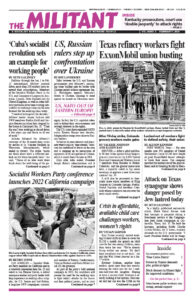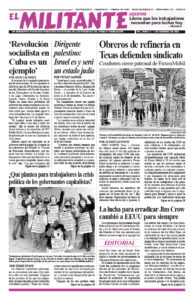February 10, 1997
The decision by New York state officials to release a list of 17 names, addresses, photos, and descriptions of people who were convicted of sex crimes marks an attack on the democratic rights of working people. It goes hand-in-hand with the reinstitution of chain gangs, and other types of punishment designed to degrade working people and portray them as non-human.
These moves are part of the offensive by the employing class and its government against the working class. The capitalist rulers seek to force working people to accept the notion that there are certain people who are less than fully human, who don’t deserve the same rights as others.
The New York measures strike directly at the right to presumption of innocence, an important conquest working people have won. These are safeguards that the working class needs to defend.
February 11, 1972
A general strike of Catholic workers has spread throughout Northern Ireland in the wake of the British army’s attack on a peaceful mass demonstration in Derry. A wave of anti-British protests is also occurring in the Republic of Ireland to the south. Thirteen civilians were left dead and at least 16 wounded when British paratroopers opened fire with automatic weapons on a demonstration of between 15,000 and 20,000.
The protesters were demanding an end to the government’s policy of internment under which some 755 Catholics have been imprisoned without charge or trial.
The attack in Derry, now referred to as “Bloody Sunday,” has been compared to the 1960 Sharpeville massacre in which 72 Blacks were shot dead by South African police and soldiers during an unarmed and peaceful demonstration against that country’s pass laws.
February 8, 1947
Nine and one half hours before the beginning of a general strike which was sure to paralyze all of Japan, U.S. General MacArthur issued an order prohibiting the strike. The unions refused to withdraw the strike threat until MacArthur alerted U. S. occupation troops to see that the order was obeyed.
MacArthur’s anti-labor action is a good example of the kind of “democracy” which the U. S. government is exporting to Japan. The strike was aimed above all at the government, because of its opposition to the unions’ demands for a 300 percent wage increase for 2,500,000 workers, and because of its stubborn refusal to adopt a program of social legislation demanded by the entire labor movement.
MacArthur’s strikebreaking intervention will have the result of increasing mass resentment against the occupation forces as well as the government.

